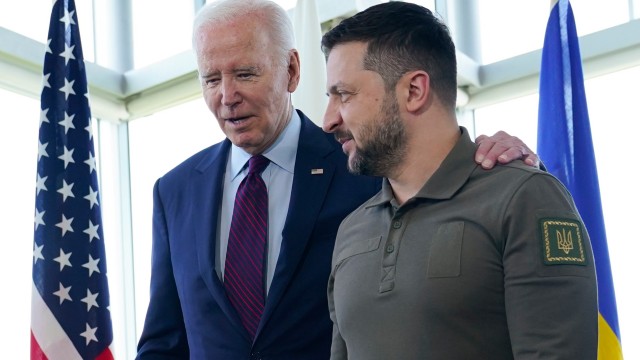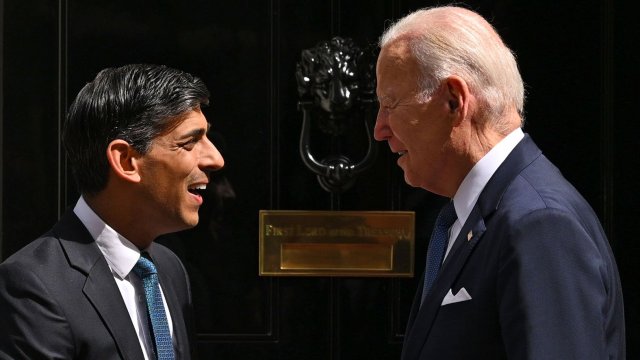
Having dashed Ukraine’s hopes of a concrete timetable for Nato membership, de facto alliance treasurer Joe Biden will be under pressure to offer Kyiv iron-clad security guarantees, of the kind it has given Israel, in this week’s key Vilnius summit.
President Biden told CNN on Sunday that Ukraine is not yet ready for Nato membership, and that Russia’s war in Ukraine had to end before the alliance could invite Kyiv into the fold, despite months of cajoling by Kyiv.
Ukrainian President, Volodymyr Zelensky, had even threatened to boycott tomorrow’s summit if a Nato membership invitation was not forthcoming. Yet Nato secretary-general Jens Stoltenberg said on Friday that Zelensky would come to Vilnius to take part in the new Nato-Ukraine Council.
Talking shops are not enough for Ukraine – or European security – however.
Nato now risks making the same mistake it did at its Bucharest summit in 2008 when it declared it “welcomed” the “aspirations” of Ukraine and Georgia to “become members of Nato” but did little else. It might as well have sent Vladimir Putin a postcard that read “Fill yer boots”. He did: in invasions in Georgia in 2008 (in which he retained 20 per cent of that country’s territory), and Ukraine in 2014, grabbing Crimea and making inroads into the east of the country, thus setting up the path for the current war.
Biden’s reluctant (and controversial) agreement to allow Ukraine cluster bombs might have been a pre-Nato summit move to placate Ukraine – or it might simply reflect that even America is running out of weapons to send. But it won’t be enough. In refusing a timetable for Nato membership, the West will have caused despair among some Ukrainians, who feel they are fighting not just for their lives but for the future of European security.
To make up for it, the West will have to provide Ukraine with a comprehensive, legally binding security arrangement; something to undermine Putin’s hopes that Russia’s willpower can outlast that of the West.
But these security guarantees need real substance. They will have to ensure that military support continues regardless of election cycles and changes of government, a clearly laid-out timetable for military supplies and investment in Ukraine’s defence industry.
The US, UK, France and Germany are currently negotiation security guarantees with Kyiv. i understands that these are likely to appear as four bilateral agreements – if Ukraine is satisfied with them. It’s not clear, however, what legal – long-term guarantees will be offered, to ensure the security outlasts election cycles.
Some of these commitments could – and should – be put in place as soon as possible, to counter Ukraine’s fear about eventualities following next year’s US presidential election.
To all this, you should probably add guarantees of post-war reconstruction (probably using frozen Russian funds) and a clear path to EU membership; the latter would require – and prompt – the improvements in Ukraine’s governance and civil society that would make Nato membership itself more viable in the medium term.
America’s relationships with Israel and Taiwan offer a solution. The US is bound by law and diplomatic arrangement to equip both to resist aggression.
A bigger problem might be getting the disunited states of Europe, which appreciates security guarantees but doesn’t like paying for them, to sign up. But the onus is now on Europe to pull its weight, along with the US, for another European country, Ukraine, if the continent is to answer those voices – and not just in Kyiv – who want Ukraine set on a path to Nato membership right now.
Some, like Alyona Getmanchuk, director of the Ukrainian New Europe Center think-tank, insist that anything less will be greeted by Putin as a victory; a confirmation that he has a veto on Nato membership – and will leave Ukraine permanently vulnerable.
There are voices in the US, too, who are pressing for a firm invitation for Nato accession to be sent to Ukraine right now.
Randy Scheunemann, who was late US senator John McCain’s chief foreign policy adviser, says fears that offering a formal invitation to Ukraine could trigger Nato’s Article 5 mutual defence clause are overstated. Article 5 does not mandate a specific response – merely assistance. This might simply take the form of the intelligence and arms supplies to Ukraine, which are currently in progress.
But that might backfire on Nato. If Article 5 is triggered and the powerful Western states don’t intervene directly, what would that say about Nato’s willingness to defend little Estonia or Latvia?
The logical solution would seem to be firm Israel-type security guarantees until some sort of peace is achieved plus a commitment to Nato membership, dependent on Ukraine meeting political/governance requirements, within a set timeframe after a ceasefire or armistice.
One argument says that a commitment to allowing Ukraine into Nato, dependent on some sort of ceasefire, will provide Putin with an incentive to continue the conflict in some form or other. But if Ukraine is sufficiently strengthened in the interim, that might not be an option for the Kremlin.
Ukrainians can’t envisage a peaceful future outside Nato. Given the courage, ingenuity and sacrifice that they have shown over the last 18 months, it will seem strange – reprehensible, even – if some such solution proves beyond the wit of the Western world’s diplomatic elite.


